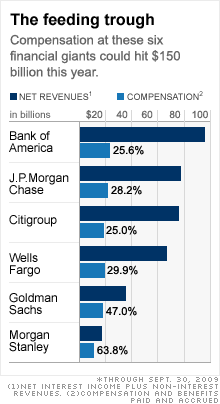The big financial pay pie
The basic issue is profits, not bonuses.

NEW YORK (Fortune Magazine) -- As the world knows, the public is up in arms about the compensation being paid at financial companies that owe their very existence to massive government help. Ordinary citizens, earning ordinary pay (or none at all), burn to see bankers and Wall Streeters get rudely cut down to size. But what many people don't focus on is that lower pay for these corporate fat cats would simply mean more money for the shareholders who own their companies. At heart, it's this year's rebound in profits that is causing the commotion. Earnings at Goldman Sachs, currently everybody's favorite piñata, are up 70%; guessing what CEO Lloyd Blankfein will make has suddenly become a parlor game. Maddeningly for anyone already mad, the government spurred the profits by keeping interest rates low and allowing financial firms to fund their operations cheaply.
Fair or not, the contest to be played out in the fourth quarter is simply whether 2009's profits will go to employees or shareholders -- or perhaps, modestly, to charitable contributions. And yes, tax collectors will share in the bounty, too, though hardly to the degree that the public would think just.
Third-quarter SEC filings are revealing about 2009 compensation. Costs attributable to an accounting period must be fully expensed on income statements, even though they may include dollars that have not yet gone out the door. So a financial company's compensation and benefits includes both (1) pay delivered and (2) accruals for end-of-year bonuses anticipated to be paid but not yet written in stone.
Through September, the six giant financial companies on the chart to the right had paid or accrued $112 billion in compensation and benefits, and to that will be added fourth-quarter dollars. Were that quarterly addition to be proportionate to the $112 billion, total compensation and benefits for the year would come to just about $150 billion. Jiminy Christmas! That's a big, round figure that could generate very negative headlines.
Of course, the top brass of these big companies could decide not to build bonuses in the fourth quarter. Past accruals could even be reversed. But that's no doubt fantasy, because it is holy writ at many firms that employees get 50%, or close to it, of a company's net revenues. Most of this pay goes to investment bankers, hot-shot traders, and other members of the corporate elite. The bulk of these folk, we can safely say, have no interest in seeing their pay shredded for the sake of more money going to the owners of the business, these being largely faceless institutions, or rich faces like Warren Buffett at Berkshire Hathaway. (BRKA, Fortune 500)
In the chart you can see the 50% rule working at Goldman (GS, Fortune 500). Through September, it expensed $16.7 billion for compensation, or 47% of net revenues. Morgan Stanley (MS, Fortune 500) is a still higher 64%, but that proportion has been boosted by an accounting rule that cut revenues.
The other four financial companies on the chart have loads of bank tellers, credit card processors, and other low-paid employees. So their proportion is below 30%. Even so, in 2008 employees in one part of J.P. Morgan Chase (JPM, Fortune 500) -- its investment bank -- were up at the 52% level. This year they're doing less well: Through nine months, the investment bank proportion was only 38%. We'll soon see if the scale tips in the fourth quarter. ![]()
-
 The retail giant tops the Fortune 500 for the second year in a row. Who else made the list? More
The retail giant tops the Fortune 500 for the second year in a row. Who else made the list? More -
 This group of companies is all about social networking to connect with their customers. More
This group of companies is all about social networking to connect with their customers. More -
 The fight over the cholesterol medication is keeping a generic version from hitting the market. More
The fight over the cholesterol medication is keeping a generic version from hitting the market. More -
 Bin Laden may be dead, but the terrorist group he led doesn't need his money. More
Bin Laden may be dead, but the terrorist group he led doesn't need his money. More -
 U.S. real estate might be a mess, but in other parts of the world, home prices are jumping. More
U.S. real estate might be a mess, but in other parts of the world, home prices are jumping. More -
 Libya's output is a fraction of global production, but it's crucial to the nation's economy. More
Libya's output is a fraction of global production, but it's crucial to the nation's economy. More -
 Once rates start to rise, things could get ugly fast for our neighbors to the north. More
Once rates start to rise, things could get ugly fast for our neighbors to the north. More







